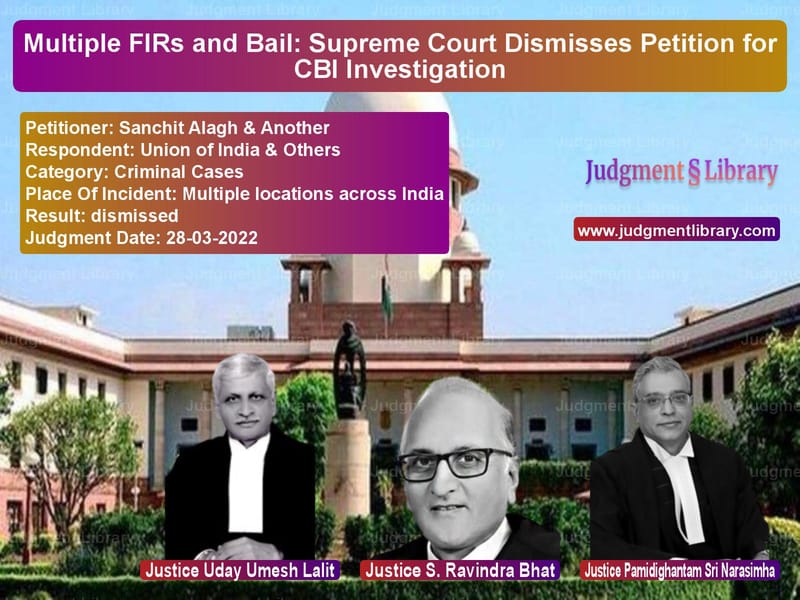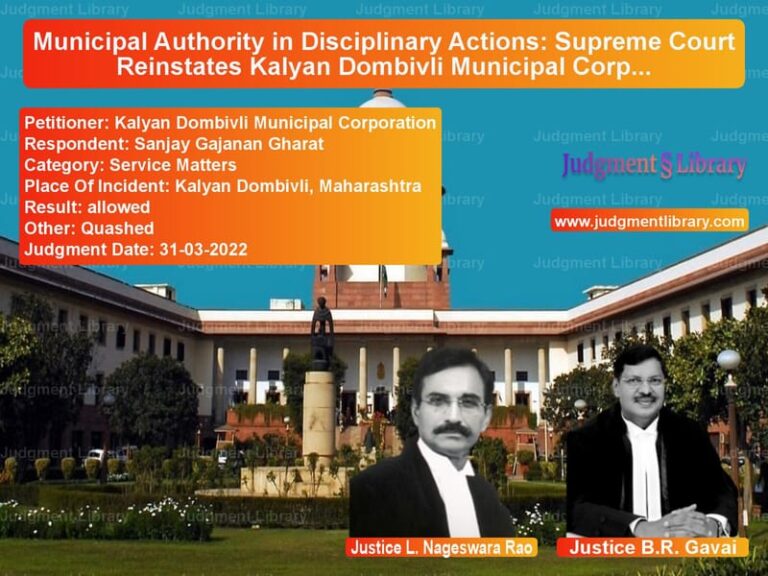Multiple FIRs and Bail: Supreme Court Dismisses Petition for CBI Investigation
The case of Sanchit Alagh & Another vs. Union of India & Others concerns a writ petition under Article 32 of the Constitution, where the petitioners sought an investigation by the Central Bureau of Investigation (CBI) into multiple FIRs filed against them in different states. The Supreme Court dismissed the plea, holding that no grounds were made out for CBI intervention and directed the petitioners to seek relief through appropriate legal channels.
This judgment is significant as it reiterates the limited scope of transferring investigations to the CBI and emphasizes the proper legal avenues available for bail and case proceedings.
Background of the Case
The case involved multiple criminal cases registered against the petitioners, Sanchit Alagh and another, in various states. The key events in the case are as follows:
- 2018: Several FIRs were registered against the petitioners in different states, alleging economic offenses and fraud.
- November 15, 2019: The Supreme Court issued notice in the matter and granted interim anticipatory bail to the petitioners.
- March 28, 2022: The Supreme Court ruled on the matter, rejecting the plea for CBI intervention.
The petitioners sought anticipatory bail and the transfer of investigations to the CBI, claiming that the multiple FIRs contained identical allegations and were being used to harass them.
Legal Issues Considered
- Whether the investigation should be transferred to the CBI.
- Whether multiple FIRs on identical allegations should be clubbed together.
- Whether the petitioners should be granted anticipatory bail in all cases.
- The legal recourse available to the petitioners for challenging FIRs and seeking bail.
Petitioner’s Arguments (Sanchit Alagh & Another)
- The multiple FIRs against them involved identical allegations and should be consolidated into one investigation.
- The investigations were politically motivated and being conducted in a biased manner.
- The matter required an independent and impartial investigation by the CBI.
- They should be granted anticipatory bail in all cases to prevent harassment.
Respondent’s Arguments (Union of India & Others)
- The investigations were being conducted as per the law by the respective state authorities.
- There was no compelling reason to transfer the case to the CBI.
- The petitioners should follow the appropriate legal procedure for challenging FIRs and seeking bail.
Supreme Court’s Judgment
The Supreme Court bench, comprising Justices Uday Umesh Lalit, S. Ravindra Bhat, and Pamidighantam Sri Narasimha, dismissed the petition and directed the petitioners to seek relief through proper legal channels.
1. No Justification for CBI Investigation
“Having gone through the facts and circumstances on record, in our view, no case is made out for interference by this Court and for transferring the investigation to the Central Bureau of Investigation.”
The Court ruled that investigations by state police were lawful and did not warrant CBI intervention.
2. Petitioners Must Seek Bail Through Proper Legal Channels
“If the petitioners have been granted regular bail, they can avail the benefit in terms of such orders; otherwise, they shall have to take steps in a manner known to law.”
The Court held that the petitioners must apply for bail in the respective courts handling their cases.
3. Multiple FIRs Not Automatically Clubbed
“The matters shall be considered on their own merits, at every stage.”
The Court ruled that FIRs would be dealt with individually as per legal procedures.
Key Takeaways from the Judgment
- The Supreme Court reaffirmed that CBI investigations are not granted as a matter of right.
- Petitioners must seek bail and case relief through appropriate state courts.
- Multiple FIRs will not be automatically clubbed together unless strong reasons exist.
Implications of the Verdict
This ruling has significant implications for criminal law and investigations:
- CBI jurisdiction will be restricted to cases of clear central importance.
- Defendants in multiple cases must seek relief through state courts.
- Legal procedures for quashing FIRs and obtaining bail must be followed.
Overall, this Supreme Court ruling reinforces the legal principle that investigations should remain with state authorities unless extraordinary circumstances warrant CBI intervention.
Petitioner Name: Sanchit Alagh & Another.Respondent Name: Union of India & Others.Judgment By: Justice Uday Umesh Lalit, Justice S. Ravindra Bhat, Justice Pamidighantam Sri Narasimha.Place Of Incident: Multiple locations across India.Judgment Date: 28-03-2022.
Don’t miss out on the full details! Download the complete judgment in PDF format below and gain valuable insights instantly!
Download Judgment: sanchit-alagh-&-anot-vs-union-of-india-&-oth-supreme-court-of-india-judgment-dated-28-03-2022.pdf
Directly Download Judgment: Directly download this Judgment
See all petitions in Bail and Anticipatory Bail
See all petitions in Fraud and Forgery
See all petitions in Judgment by Uday Umesh Lalit
See all petitions in Judgment by S Ravindra Bhat
See all petitions in Judgment by P.S. Narasimha
See all petitions in dismissed
See all petitions in supreme court of India judgments March 2022
See all petitions in 2022 judgments
See all posts in Criminal Cases Category
See all allowed petitions in Criminal Cases Category
See all Dismissed petitions in Criminal Cases Category
See all partially allowed petitions in Criminal Cases Category







